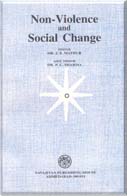|
NON-VIOLENCE AND SOCIAL CHANGE : Editor - Dr. J. S. Mathur, Asst. Editor - Dr. P. C. Sharma
Published by : Navjivan Mudranalaya, Ahmedabad 380 014, India.
Pages : 287+14
Price : INR 100/-
ISBN 81-7229-208-2. About the Book: This book is an exhaustive work by Professor J. S. Mathur, University of Allahabad. This book is a compilation of papers received from a seminar on Non-violence and Social Changes held from 30th January 1971, to 1st February, 1971 jointly organized by Gandhi Bhawan and Christian Institute for the Study of Religion and Society. It constitutes four basic subjects: Basic objective of social change; Gandhian Aspect of Non-violence; Non violence and Rapidity of change; and Non-violence and Institutional change. Forty-six schools from all over India and abroad contributed papers on these subjects. If we examine the concept of non-violence as advocated by Gandhi, we will realize that his was a prescription not of the weak but of the strong. He proved in his life time that the unorganized and the weak can perform miracles if they got trained in the art of non-violent techniques of change. Non-violence does not mean passivity or inaction; but dynamic action. Non-violence as preached and practised by Gandhi is not a single virtue or a single quality of life but congeries of qualities or virtues like compassion, selflessness, self-renunciation, to the extent of reducing oneself to zero & fearlessness for to Gandhi quality mattered rather than numbers. He advocated the practice of non-violence in every walk of life-individual, institutional, political, social and economic. Several instances of non-violent techniques bringing about socio-economic and consequentially institutional change can be sighted from the Indian experience, and the campaigns organized by Gandhi. He gave a death blow to the system of untouchability, an age old practice, through his non-violent struggle. His struggle against the Roulette bill and his Salt Satyagraha are other examples of the success of this technique. The rapidity with which non-violent techniques succeeded during the communal disturbances was proved by him during 1946-47. Lord Mountbatten described him as a ‘one man force’. Gandhi himself held the opinion that “the existing structure of economic society will not last for 24 hours until the weapon of Satyagraha is gripped by the people”. Humanity must steadily march towards the attainments of a socio-economic society based on justice and fair play through non-violence. In this race for material power mankind will not be able to save itself from self-destruction unless we all mange to practice non-violence in our relations with our fellow-men. |
